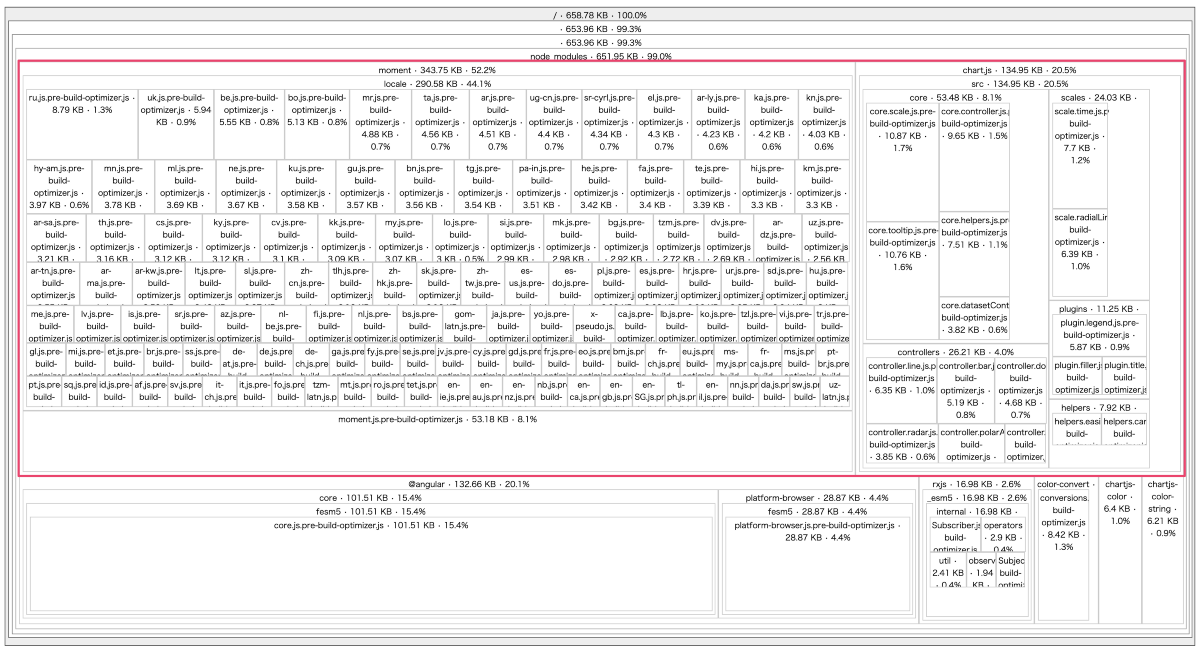This post explains how to import large 3rd-party libraries into your Angular application without pain on initial payload size.
Example: Chart.js in Angular
Chart.js is a popular library to render rich charts. It contains a lot of features and its payload size is huge.
To use it in your Angular application, typically you write a import statement in TypeScript code and call it like the below;
import { Component, ViewChild, ElementRef } from "@angular/core";
// Import 'chart.js' package
import * as Chart from "chart.js";
@Component({
selector: "app-root",
template: `
<div>
<canvas #chart></canvas>
</div>
`
})
export class AppComponent {
@ViewChild("chart") chartElement: ElementRef<HTMLCanvasElement>;
ngOnInit() {
new Chart(this.chartElement.nativeElement, {
/** chart configurations */
});
}
}As you can expect easily, this import makes main.bundle.js large. Increasing the initial payload size is one of what we want most to avoid.


Use import()
import() is a new feature of ECMAScript. It loads a script dynamically in runtime. In the future, all modern browsers support it natively. But today, its support is not enough.
Can I use… JavaScript modules: dynamic import()
No problem, webpack helps us. webpack can replaceimport() calls with its own dynamic module loading function in the bundling flow. You can imagine it just like a polyfill.
Because Angular CLI uses webpack, we can use it, even in Angular CLI-based applications. There is no “eject”. Don’t worry! :)
Preparation: Edit tsconfig.json
Also, TypeScript has support for dynamic import() , but it is enabled only in some module types. Open tsconfig.json at the root directory and set its module field to esnext . It doesn’t affect the final bundle’s browser compatibility because all module resolutions are solved by webpack behind of Angular CLI.
{
"compileOnSave": false,
"compilerOptions": {
"baseUrl": "./",
"outDir": "./dist/out-tsc",
"sourceMap": true,
"declaration": false,
"module": "esnext",
"moduleResolution": "node",
"emitDecoratorMetadata": true,
"experimentalDecorators": true,
"importHelpers": true,
"target": "es5",
"typeRoots": ["node_modules/@types"],
"lib": ["es2018", "dom"]
}
}Migrate to dynamic import()
Call import() in the TypeScript code simply like following. That’s all…
import { normalizeCommonJSImport } from '../utils/normalizeCommonJSImport';
// import() returns a Promise
const importChart = normalizeCommonJSImport(
import(/* webpackChunkName: "chart" */ 'chart.js'),
);**
@Component({ ... })
export class AppComponent {
@ViewChild('chart') chartElement: ElementRef<HTMLCanvasElement>;
async ngOnInit() {
// Wait for dynamic import resolution
const Chart = await importChart;
new Chart(this.chartElement.nativeElement, {
/** chart configurations */
});
}
}normalizeCommonJSImport is a utility function for compatibility between CommonJS module and ES modules and for strict-typing.
export function normalizeCommonJSImport<T>(
importPromise: Promise<T>
): Promise<T> {
// CommonJS's `module.exports` is wrapped as `default` in ESModule.
return importPromise.then((m: any) => (m.default || m) as T);
}For details about module compatibility, please read this.
webpack 4: import() and CommonJs
In this case, TypeScript’s import() returns Promise<typeof Chart> as well as import * as Chart from ‘chart.js’. This is a problem because chart.js is a CommonJS module. Without any helpers,default doesn’t exist in the result of import() . So we have to mark it as any temporary and remark default as the original type. This is a small hack for correct typing.
As the result, you can see separated bundles like below. chart.<hash>.js is not marked as [initial]; it means this bundle is loaded lazily and doesn’t affect initial bootstrapping.


Conclusion
- Static importing large libraries brings big pain for initial bootstrapping performance.
- Dynamic importing will come to modern browsers in the future, and we can use it today with webpack’s help.
- There are some issues which we have to care about around CommonJS-ESModules compatibility.
The full code example is here. Thanks.